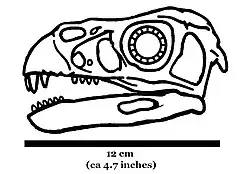Incisivosaurus
Incisivosaurus ("incisor lizard") is a genus of small, probably herbivorous theropod dinosaur from the Lower Cretaceous of what is now the People's Republic of China.
| Incisivosaurus Temporal range: Lower Cretaceous, 125 mya | |
|---|---|
 | |
| Illustration of Incisivosaurus skull. | |
| Scientific classification | |
| Kingdom: | |
| Phylum: | |
| Class: | |
| Superorder: | |
| Order: | |
| Suborder: | |
| Infraorder: | |
| Genus: | Incisivosaurus Xu, Wang & Chang, 2002 |
| Species | |
| |
The first specimen is a skull that was collected from the lowermost levels (the fluvial Lujiatun beds) of the Yixian Formation. The beds were laid down 125 million years ago (mya) in the Sihetun area, near Beipiao City, in western Liaoning Province.
The most significant, and highly unusual, characteristic of this dinosaur is its apparent adaptation to an herbivorous or omnivorous lifestyle. Its name refers to its rodent-like front teeth, which show wear patterns commonly found in plant-eating dinosaurs.[1]
Description
The initial description of Incisivosaurus showed that the skull, about 10 cm in length (4 inches), had the most complete dentition known for any oviraptorosaur. Their cladistic analysis indicated that Incisivosaurus lies at the base of the oviraptorosaurs, making it more basal than Caudipteryx and Oviraptor. The distinguishing skeletal features of Incisivosaurus, include a long snout half the total length of the skull, a slender lower jaw with a long fenestra (opening), and its distinctive, large, flattened front teeth. In addition to these unique features, Incisivosaurus shared many traits with more typical oviraptorosaurs, so it is classified in that group.
Several features, including its numerous teeth (most advanced oviraptorids were toothless), show that it was a primitive member of the group. Several features of the skull are similar to the therizinosaurs, another theropod group that was probably herbivorous.[2]
In 2009 the holotype skull was scanned and analyzed in three dimensions. The results indicated that Incisivosaurus had fewer bird-like air spaces in the skull bones than later oviraptorosaurs did. It also found that Incisivosaurus had reduced olfactory lobes and expanded optic lobes, like ornithomimids. These features of oviraptorosaurs were similar to those of birds.[3]
Incisivosaurus is assumed to have been feathered like most other maniraptoran theropods. Its total body length has been estimated at just under 1 meter (3 ft.). It is possible that Incisivosaurus is the same species as Protarchaeopteryx, though more fossil specimens are needed before the two can be directly compared.
References
- Xu X. et al 2002. An unusual oviraptorosaurian dinosaur from China. Nature, 419: 291-293.
- Osmolska H; Currie P.J; and Barsbold R. 2004. "Oviraptorosaura." in The Dinosauria. Weishampel D.B; Dodson P. and Osmólska H. (eds) 2nd ed, University of California Press.
- Balanoff, Amy M. et al 2009. Cranial osteology of the theropod dinosaur Incisivosaurus gauthieri (Theropoda: Oviraptorosauria). American Museum Novitates, #3651. New York.